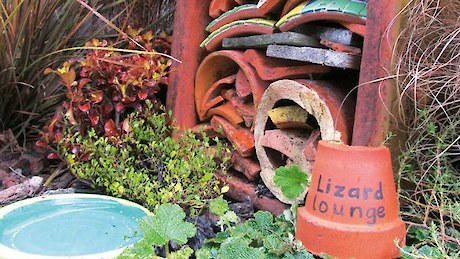 Planting and spending time outdoors is great for the soul and mental health, plus you can provide shelter, food and improved habitat for native species.
Planting and spending time outdoors is great for the soul and mental health, plus you can provide shelter, food and improved habitat for native species.
Any garden can be made more attractive to wildlife, even if it is only a few square metres. Your garden may not be large enough for birds to nest and breed, but they may still use it for food and as a stopping point between patches of wetland and native bush that are often thinly spread across urban areas. A few well-placed tweaks can make a heap of difference.
Here’s Auckland Council’s advice on how to attract birds to your garden.
And some sage advice from Ecology Ngātahi for making your patch bird-friendly:
Tips for a biodiverse garden
Often, doing less is best. Very few native species have adapted to our Eurocentric gardens with their manicured lawns and tidy borders. Skinks, geckos, butterflies and native pollinating insects don’t want everything all neat and tidy. They all prefer things unkempt. Leave a few wild corners and marginal habitats.
The Department of Conservation offers lots of great advice.
Plant smart in your backyard
Flowers that attract birds are usually large and brightly coloured with lots of nectar. Butterflies have more specific needs. You can also take Auckland Council’s advice to Plant to support birds, insects and lizards . The leaflet Pollinators and Plants - A Precious Partnership (PDF, 911.23 kB) is packed with advice.
- Plant kōwhai and puriri to attract kererū and tūī.
- Plant nettles (either the europeant stinging nettle or the native ongaonga) to attract kahukura (red admiral) and kahukōwhai (yellow admiral) butterflies
- Plant Muehlenbeckia species to stabilise banks and attract copper butterflies
- Plant NZ grasses and native ground cover
- Other good species for suburban gardens include: Coprosma repens (Taupata), hebe stricta (koromiko), kowhai, mountain flax, Astelia and native broom.
Garden clever
If you only plant a few plants, and your neighbour has another few, and their neighbour some more, then collectively this creates a network of plants which birds can use to travel from one area to another and get food. This is the idea behind the creation of wildlinks throughout the city which birds can travel along.
- Understand your garden environment – know where it gets wet, dry, sunny, or windy
- Plant native trees and shrubs any chance you get. If you live by a forest margin, use Auckland Council’s Forest Ecosystems page to help you on your way.
- Choose locally sourced plants that whakapapa to your area
- Do not leave big gaps between plants to prevent weeds from growing
- Mulch around plants to help keep soil moist
Keep streams healthy
Plant native plants to stabilise banks, improve habitat and reduce pollution. If in doubt use Auckland Council’s Stream Ecosystem pages.
Keep it sweet in winter
Nectar can be in short supply in the winter months. Try making a sugar water nectar – mix half a cup of raw sugar with hot water to dissolve it, and make up to one litre by adding cold water. Put out a little at a time and try decorating the nectar with large flowers like bottlebrush to attract tūī. Make sure to keep it clean and change regularly to stop disease spreading. And put your feeder out of reach of cats.
Help them make your home their home
Make your garden more welcoming by doing a little DIY. For guidance on making bird feeders and wētā motels (and rat-proofing your compost bin), check out The Workshop.
Make your garden lizard-friendly
Predator Free NZ says it all with this lovely poster. Download a copy here.

